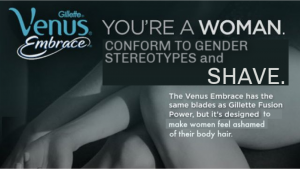Original ad:

This is an advertisement for Gillette’s female-targeted razor products, the Venus Embrace. Gillette’s advertisement is problematic because it puts forward false gender differences and reinforces gender stereotypes, namely, the pressure for women to remove body hair in the name of beauty and the sexually suggestive portrayal of women in mass media.
The ad emphasizes the difference between men and women, suggesting that women shave differently than men; therefore, women require a specific razor for shaving. Gender-targeted products such as the Venus Embrace are problematic and adopted on a massive scale by consumer packaged goods marketers as a way to target women to increase profits. Gillette’s message promotes the idea that women and men lead very different lives and have different anatomies when it comes to shaving, alluding to gender differences that are not true. I believe that false differences make room for gender inequality and that gendered products play a role in supporting such problem. Unfortunately, reinforcing gender differences is not the only issue that comes with products like the Venus Embrace. Price discrimination is often present in such industry where female-targeted products are more expensive than their male counterparts. This is a phenomenon called ‘Pink Tax’ that calls attention to the fact that women pay an average of 43 percent more for toiletries such as razors and shampoo than men do.
In this particular ad, Gillette is also trying to convey that women need to shave. This message puts pressure on women to conform to beauty standards as they are expected to have smooth legs and no armpit hair in order to look desirable. Such belief reinforces a gender norm that makes women feel ashamed for having natural bodies, increases spending among women and negatively impacts their self-esteem. Lastly, the ad also features in the background a woman with hairless, smooth, and retouched skin in a suggestive pose. Women’s bodies have long been sexualized in advertising, where women in sexually revealing clothing were shown in ads six times more than men between 2006 and 2016.
Jammed version of the ad:

Jamming Philosophy
In the jammed version of Gillette’s ad, I altered the tag line to “You’re a woman. Conform to gender stereotypes and shave” emphasizing Gillette’s reinforcement of injurious gender norms around shaving. The alteration is meant to highlight that women are subject to many gender stereotypes even for minor things like shaving. I also altered the small text to state that Venus Embrace is “designed to make women feel ashamed of their body hair”. The alteration implies that body shaming is Gillette’s tactic to increase purchases of razors among women.
The drastic change in the massage reveals that the carefully-crafted original ad was produced to ensure consumers realize the demand for razor products, taking advantage of the hair removal trend in order to generate sales. Such capitalistic act is manipulative and destructive. By looking at the jammed version of the ad, I hope the audience realizes the detrimental effects of gender stereotypes. Women’s perceived need to be desirable by conforming to beauty standards often takes a toll on women’s self-esteem. Women should not be ashamed of their natural bodies, especially while men do not feel the same pressure to upkeep a high-maintenance beauty routine. Gender inequality is prevalent in our society and is displayed through mainstream media like this particular ad as it makes the issue a norm.
With the alteration, I hope the audience becomes more aware of sexism in advertising. Shedding light on this topic is meant to evoke the feeling of empowerment. I hope more consumers push back against unnecessarily-gendered products and absurd standards that negatively impact women’s confidence.
References:
Richards, K. (2017, September 26). Women Continue to Be Sexualized and Misrepresented in Ads, Even in 2017. Retrieved from https://www.adweek.com/brand-marketing/women-continue-to-be-sexualized-and-misrepresented-in-ads-even-in-2017/.
Shaw, H. (2016, April 25). ‘Pink tax’ has women paying 43% more for their toiletries than men. Retrieved from https://business.financialpost.com/news/retail-marketing/pink-tax-means-women-are-paying-43-more-for-their-toiletries-than-men.